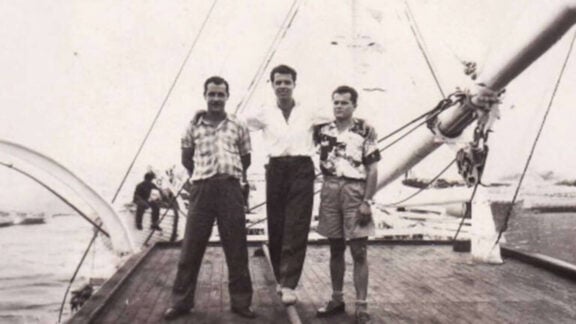A youth-led enterprise saw a different focus placed on OXI Day, evaluating how Greece was impacted by one of the worst human atrocities committed: the Holocaust.
The event was held on Thursday evening at Macquarie University’s P.G. Price Theatre and was organised jointly by the Macquarie University Greek Association (MUGA) and Youth HEAR (Holocaust Education and Remembrance).
The initiative titled “Experience of Survival” shed light on the difficulties suffered by the Jewish people in Greece during World War II, many of whom fell victim to Germany’s destructive Final Solution.
MUGA President Dean Gongolidis opened the event with a short address where he honoured the efforts by the Greeks in defending the principles of democracy, freedom and justice.

“I would like to acknowledge the brave men and women who defended these principles as they serve as a beacon for hope. Not only for Greeks but for all nations and all peoples,” the President said in his speech.
“Their defiance has not only protected the sanctity of their homeland but also marked the beginning of a turning point against the Axis powers in Europe.”
The MUGA President then introduced the keynote speaker, Dr Steven Bowman, an American scholar and academic that specialises in Greek and Jewish relations during the Byzantine and Holocaust periods.

Dr Bowman addressed the audience remotely via zoom, first providing the background of OXI Day, stating its relevance as the moment Greece entered the second World War.
The academic stated how the mountains were a common place where people and resistance fighters (including Jewish refugees) hid from the Axis forces, and they even managed to bring supplies up there such as a fridge.
He went on to explain that Greece became involved with Hitler’s plan to kill all the Jews in Europe, notably witnessing a mass deportation of Thessaloniki’s Jewish population to concentration camps (including Auschwitz) from March 1943 through to the summer that same year.

“The total population of Jews in Thessaloniki in January of 1943 was roughly 55,000. Immediately after the war, some 800 had returned from the camps,” Dr Bowman said in his address.
The historian stated that only 2,000 Jews approximately returned from the camps to Greece.
Following Dr Bowman’s speech, a video created by the students played documenting a few people’s thoughts on OXI Day and its meaning to them as an important moment of survival in Modern Greek history.
The formal program concluded with a performance by the Australian Hellenic Choir, singing three songs: “Τα πρώτα λόγια του Χριστού” (Ta prota logia tou Hristou) by Stavros Kouyioumtzis, ”Νύχτωσε χωρίς φεγγάρι” -(Nyhtose horis feggari) by Apostolos Kaldaras and Άσμα Ασμάτων (Asma Adsmatton) by Mikis Theodorakis.

The lyrics of the last song were notably written by Ιάκωβος Καμπανέλλης, who was a prisoner for three years at the Mauthausen concentration camp during World War II.
Among the attendees were the Consul General of Greece in Sydney, Yannis Mallikourtis, Father John Kapetas, President of the Greek Studies Foundation at Macquarie University, Theophilos Premetis, the coordinator of SAE Oceania, John Theodoridis, Dr Panagiotis Diamadis Secretary of AHEPA NSW.
In addition to the various committee members of MUGA, there were also representatives from Sydney University Greek Society and UTS Hellenic Society.








